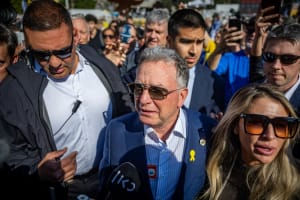Starvation, beatings, lack of medicine – Hostage families share glimpse into horrors of Hamas captivity
Male hostages return home in worse condition than female hostages

As the Israeli hostages return home from Gaza after more than one year, their families are beginning to report on the difficult conditions they faced in Hamas captivity.
The six hostages recently said they were severely punished without explanation, subjected to physical and psychological torture, and interrogated about their military past.
Several hostages reported receiving meager rations, with their food supply increasing only in the days leading up to their release
While the female hostages who returned in the current hostage-ceasefire deal testified that they were mostly kept in private homes of Gazan families, the male hostages say they were primarily kept in tunnels underground. Medical teams reported that the hostages returned with various mild conditions, indicating prolonged malnutrition and lack of exposure to sunlight.
During IDF bombings, the men were sometimes moved into deeper tunnels, which were narrower.
Israeli hostage Omer Shem Tov, who returned on Saturday, told his parents that he was “afraid to fall asleep, to wake up, and to realize that it was a dream.”
Shem Tov was kept by himself in a tunnel after the release of Itai Regev in the November 2023 hostage-ceasefire deal. He suffers from asthma and didn't receive any medication during his captivity.
Both Omer Wenkert and Eliya Cohen reported that they were kept isolated in tunnels most of their captivity, were deliberately starved, and even held in cages part of the time. Wenkert was not exposed to any media and had no idea about the efforts to secure his release. Wenkert suffers from an inflammatory bowel disease and did not receive any medication for his condition, despite attempts by the Israeli government to transfer medications to the hostages.
Cohen has epilepsy and was also kept without any access to medication. His family said that during his captivity, he underwent surgery to extract bullets from his body without anesthesia.
The family said also he was held captive with hostages Alon Ohel, Eli Sharabi and Or Levy. The men were often chained together by hands and feet to prevent their escape. This caused wounds, as well as beatings from their captors. Sharabi and Levy were returned two weeks before Cohen. Alon Ohel is still in captivity, and Cohen said Ohel is being held alone after the release on Saturday.
Sha’aban al-Sayed, father of returned Bedouin hostage, Hisham, said his son returned severely troubled after a decade in Hamas captivity. Hisham has a diagnosed history of mental issues, including a 2010 diagnosis of “acute psychotic disorder” and a 2013 diagnosis of schizophrenia.
Hisham wandered into the Gaza Strip in 2015 and was abducted by Hamas terrorists. His family attempted to secure his release multiple times over the past decade, including sending messages to leading Muslim clerics in Gaza.
Sha’aban said his son’s condition indicates that he was severely mistreated.
“We were happy to be able to have him, but when I hugged him I saw that I was hugging something that wasn't a human being. It looks like a human being, but it's not a human being,” Sha’aban said. “He doesn't know how to talk, he doesn't have a voice, he has no memory of anything. It's simple, it gives the feeling that he wasn't held by human beings, and we're angry about it and we want an answer, why this is happening with the hostages?”
Hostage Agam Berger, one of the female IDF observation scouts who was released at the beginning of the current hostage-ceasefire deal, said the terrorists would prevent her and Liri Elbag, with whom she was being held, from speaking in Hebrew. She explained that the neighbors didn't know they were there, and that Hamas preferred that as few people as possible knew where they were being held.
Medical officials in Israel have pointed to the premature baldness and hair bleaching demonstrated by many of the returning male hostages as evidence of the long-term malnutrition and stress endured by the men during the almost year and a half of captivity.
The hostage families and the returning hostages themselves have all urged government officials to do whatever is necessary to bring the remaining hostages home, citing mistreatment.
Despite the demand of the families to release the remaining hostages in one go, the Israeli government appears to be trying to extend phase one to additional humanitarian stages, which will include the release of four fathers of young children – David Cuneo, Omri Miran, Elkana Bohbot and Maxim Harkin – alongside injured or sick abductees whose condition has only now been revealed due to the testimonies of the returning hostages.
Of the 59 abductees who were not included in the first phase, 35 are believed to be dead. Families of most of the other 24 have received signs of life in recent weeks.
Israeli Prime Minister Benjamin Netanyahu has promised that he will continue to work to bring all of the remaining hostages home.

The All Israel News Staff is a team of journalists in Israel.













